Medical expert of the article
New publications
Preparations
Prostate cancer pills
Last reviewed: 08.07.2025

All iLive content is medically reviewed or fact checked to ensure as much factual accuracy as possible.
We have strict sourcing guidelines and only link to reputable media sites, academic research institutions and, whenever possible, medically peer reviewed studies. Note that the numbers in parentheses ([1], [2], etc.) are clickable links to these studies.
If you feel that any of our content is inaccurate, out-of-date, or otherwise questionable, please select it and press Ctrl + Enter.
Malignant lesions of the prostate are the second most common oncological diseases, behind lung pathologies. Prostate cancer pills are part of a complex of treatment procedures aimed at destroying pathological cells. Most often, the disease is diagnosed in elderly and middle-aged men. According to statistics, a man over 60 has a 50% out of 100 chance of getting prostate cancer. Every year, 40,000 people are diagnosed with this pathology in the world, 15,000 of them die.
The causes of the disease are not precisely established, very often it occurs against the background of high levels of male sex hormones, due to prolonged contact with chemicals or when working in galvanic production. Eating food with a high content of animal fats, viral and bacterial infections can also provoke pathology.
The success of prostate cancer treatment depends on timely detection of symptoms and diagnostics. The first signs of the disorder look like this: weakening of the urine stream, pain during urination, frequent urge to go to the toilet at night, blood in the urine. For diagnostics, a digital rectal examination, ultrasound, CT, MRI, biopsy of the gland and a number of laboratory tests are used. In the process of verifying the diagnosis, the doctor establishes the stage of the pathology and determines the nature of its therapy.
In the early stages of cancer, the following treatment methods are used:
- Radical prostatectomy
- Radiation therapy
- Brachytherapy
- HIFU (transrectal high intensity focused ultrasound ablation of the prostate gland)
- Chemotherapy
- Dynamic observation
If the cancer is localized, drug therapy is used for treatment in combination with radical prostatectomy or radiation therapy. The 10-year survival rate after such procedures is 90%. This method is used at stages I and II of the disease. Chemotherapy is considered an auxiliary method, since prostate tumors have low sensitivity to chemotherapy drugs. Medicines are effective in hormone-resistant forms of generalized oncology.
Casodex
Antiandrogenic nonsteroidal agent with antitumor properties. Casodex is available in tablet form with the active ingredient bicalutamide. The drug is a racemic mixture that binds to androgen receptors, suppressing their stimulating effect.
After oral administration, the drug is quickly and completely absorbed from the gastrointestinal tract, food intake does not affect its absorption. Plasma protein binding is high - 96-99%. Metabolizes in the liver, excreted in urine and bile in equal parts.
- Indications: widespread prostate cancer. In most cases, it is used in combination with a GnRH analogue, surgical castration. The standard dosage is 50 mg once a day. The duration of therapy is determined by the attending physician.
- Contraindications: intolerance to the components of the drug, simultaneous use with Cisapride, Astemizole or Terfenadine. Not used to treat women and children, as well as patients with lactose intolerance, liver dysfunction, lactase deficiency, glucose malabsorption syndrome.
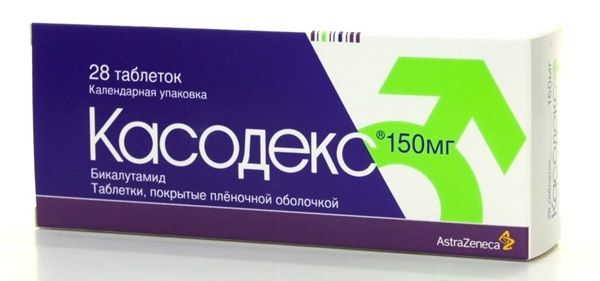
- Side effects: dizziness, abdominal pain, nausea and constipation, hot flashes, transient increase in liver enzymes, skin allergic reactions. In rare cases, angioedema, interstitial pulmonary pathologies, cardiac or hepatic failure occur.
- Overdose has symptoms similar to side effects. There is no specific antidote, so symptomatic therapy is indicated for treatment. Dialysis is ineffective, monitoring of vital functions of the body is mandatory.
 [ 1 ]
[ 1 ]
Bicalutamide
An antitumor pharmacological agent from the group of nonsteroidal antiandrogens. Bicalutamide, after entering the body, binds to androgen receptors and stops the flow of androgens to malignant cells. The action of the drug is based on the effect on the endocrine system.
After oral administration, the active components are rapidly absorbed from the gastrointestinal tract. Plasma protein binding is 96%. The half-life is about 7 days. It is excreted as metabolites by the kidneys and intestines.
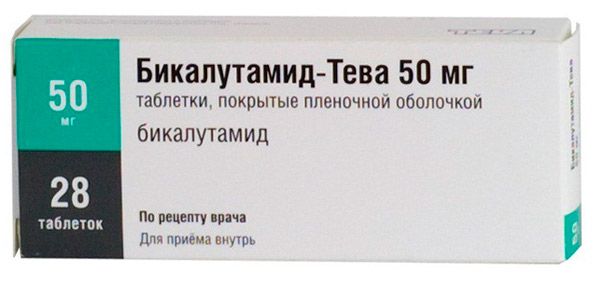
- Indications for use: widespread prostate cancer, locally advanced (used as monotherapy), without metastasis. Tablets are taken regardless of food, 1 tablet 1 time per day at the same time. Duration of therapy is more than 24 months.
- The dosage regimen depends on the stage of the disease and its etiopathogenesis. For monotherapy, 150 mg per day is prescribed, for complex treatment simultaneously with GnRH analogues, 50 mg per day. Contraindicated for use in case of intolerance to the components of the drug.
- Side effects: headaches and dizziness, insomnia, drowsiness, anemia, muscle weakness and temporary loss of sensitivity, polyuria, dysuria, enuresis, gynecomastia, decreased libido, decreased appetite, abdominal pain, nausea and vomiting, cardiovascular ailments, inflammatory lung diseases and allergic skin reactions. The likelihood of side effects increases with increasing dosage. Overdose has similar symptoms. Symptomatic therapy is used to eliminate it.
Flutamide
Tablets against prostate cancer with antiandrogenic antitumor activity. Flutamide has an active substance - flutamide 250 mg, which blocks the interaction of androgens with their cellular receptors. Active components prevent testosterone activity at the cellular level, acting as an addition to the drug castration of GnRH (gonadotropin-releasing hormone). The drug targets the prostate gland and seminal vesicles.
After oral administration, the tablets are rapidly absorbed from the gastrointestinal tract. Metabolized in the liver, the maximum concentration in the blood plasma is achieved after 2 hours. Binding to plasma proteins is 94-96%. Excreted mainly in the urine, about 5% is excreted in the feces within 72 hours after administration.

- Indications: metastatic prostate cancer with testosterone suppression. The drug is used at the beginning of combination therapy with GnRH agonists, during surgical castration, for the treatment of cancer patients already receiving GnRH agonists. The dosage is usually standard - 1 tablet 3 times a day, every 8 hours. Treatment is stopped when signs of disease progression appear or with a persistent positive effect.
- Contraindications: intolerance to the components of the drug, severe liver dysfunction. It is used with special caution to treat patients with reduced liver function, cardiovascular diseases and a tendency to thrombosis.
- Side effects: most often, patients experience the following reactions: gynecomastia, galactorrhea, decreased libido, suppression of spermatogenesis. Less common are nausea and vomiting, increased appetite and transaminase activity, insomnia, headaches and dizziness, decreased visual acuity, skin allergic reactions, swelling, and urinary disorders.
- Overdose manifests itself as aggravation of side effects. To eliminate adverse symptoms, it is necessary to induce vomiting, take absorbents and conduct symptomatic therapy with monitoring of vital functions.
Diphereline
A medicinal product with the active substance triptorelin, which is a synthetic analogue of natural GnRH. Diphereline stimulates the gonadotropic function of the pituitary gland and inhibits it, suppressing the functions of the testicles and ovaries. Long-term use of the drug causes chemical castration in men and artificial menopause in women. The therapeutic effect is observed 20 days after the start of therapy. Diphereline is available in the form of a lyophilisate in vials of 0.1 mg, 3.75 mg and 11.25 mg with ampoules of solvents included.
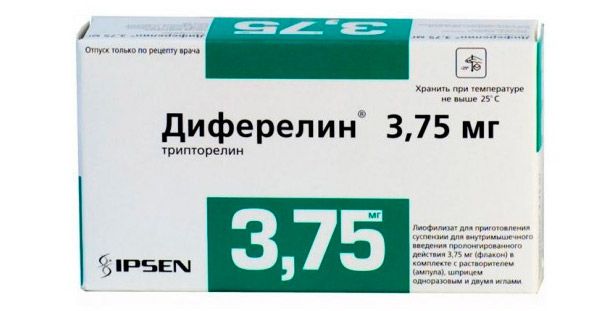
- Indications for use: adenocarcinoma and prostate cancer (with metastases, localized), breast cancer, uterine myoma. Can be used to stimulate fertilization in female infertility in IVF programs. The treatment is long-term, the dosage is determined by the attending physician. In case of prostate damage, 1 ampoule of 3.75 mg is prescribed every 28 days.
- Side effects: Quincke's edema and other allergic reactions, bone demineralization, pain syndrome, headaches and muscle pain, increased sweating, ureteral obstruction, changes in breast size, decrease in testicles, bouts of nausea and vomiting, weight gain, temporary loss of sensitivity in various parts of the body, hematuria, tachycardia, alopecia.
- Contraindications: hypersensitivity to triptorelin, mannitol and their analogues, osteoporosis, hormone-resistant prostate cancer, pregnancy and breastfeeding, condition after surgical castration. Overdose is manifested by increased side effects. Treatment is symptomatic, in severe conditions hospitalization is indicated.
ECHO 7 Rigvir
A non-genetically modified viral agent used in virotherapy. ECHO 7 Rigvir selectively affects malignant cells in sensitive tumors without affecting healthy tissue. The virus contained in the drug does not multiply in the body. Its cytolytic action is associated with oncolytic and oncotropic properties or the ability to destroy cancer.

- Indications for use: removal of the primary tumor and prevention of prostate cancer metastases. Effective in melanoma, stomach cancer, rectum and colon, pancreas, bladder, kidney cancer. Prescribed for various types of sarcoma. Can be combined with other antitumor agents, radiation therapy or chemotherapy. Its therapeutic effect is 40% higher compared to other agents. The drug can only be used in a hospital setting under strict medical supervision.
- The medication is available as intramuscular injections of 2 ml. It contains the ECHO-7 virus strain. Intramuscular injections are administered cyclically, the first course lasts 3 months. The total duration of treatment is about 3 years, followed by maintenance therapy. During treatment, it is very important to monitor the immune system and control the state of vital functions.
Firmagon
Selective gonadotropin-releasing hormone antagonist. Firmagon contains the active substance degarelix, which binds to pituitary GnRH, reducing the release of gonadotropins. Thus, the level of testosterone secretion in the testes decreases. It is available in injection form for subcutaneous administration.
Indications: progressive hormone-dependent prostate cancer. Contraindicated in case of hypersensitivity to the active component. The drug is administered subcutaneously in the abdominal area, periodically changing the injection site. The initial dosage is 240 mg, usually divided into two doses of 120 mg. After the initial dose, a maintenance dose of 80 mg is indicated.
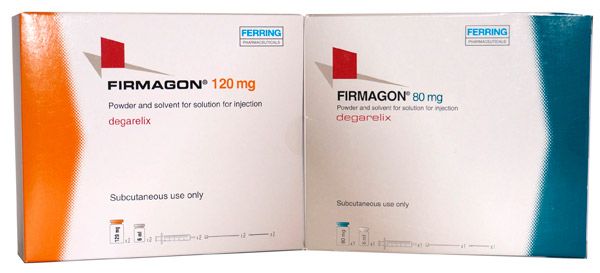
Side effects occur in many organs and systems, but most often patients experience the following reactions: insomnia, headaches and muscle pain, decreased libido, urinary disorders, irritation, cardiovascular disorders, dry mouth and constipation, cough, anemia, urticaria, liver failure, local allergic reactions.
 [ 11 ], [ 12 ], [ 13 ], [ 14 ]
[ 11 ], [ 12 ], [ 13 ], [ 14 ]
Triptorelin
Cytostatic agent, gonadorelin analogue. Triptorelin blocks the release of gonadotropic hormones by the pituitary gland. The maximum therapeutic effect develops on the 21st day of therapy. Bioavailability with intramuscular administration is 39%, with subcutaneous 69%. Distribution by tissues and organs takes about 3-4 hours. It is excreted slowly, as metabolites in the urine.
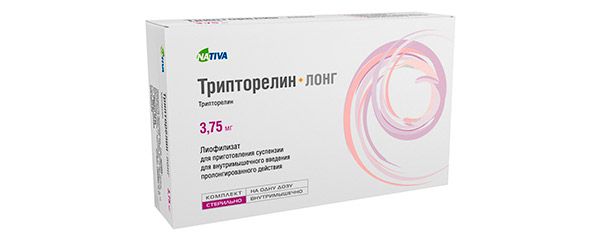
- Indications for use: prostate cancer to suppress testosterone secretion, ovarian carcinoma of epithelial etiology, endometriosis, uterine fibroids, premature puberty, IVF (in vitro fertilization) program.
- Dosage and method of administration: subcutaneous administration of 0.5 mg for a week with subsequent maintenance use of 0.1 mg per day. Before using the drug, it is very important to monitor the level of sex hormones, exclude pregnancy and monitor the rate of reduction in the size of the fibroid.
- Contraindications: hypersensitivity to the components of the drug, hormone-independent prostate adenoma, polycystic ovary disease, osteoporosis, post-prostatectomy condition, pregnancy and breastfeeding.
- Side effects: decreased libido, increased fatigue, muscle and headaches, discomfort during intercourse, paresthesia, visual impairment, nausea and vomiting, increased cholesterol, hyperemia, itching at the injection site, demineralization of bone tissue, hot flashes, impotence. To eliminate them, I adjust the dosage and conduct symptomatic treatment.
Attention!
To simplify the perception of information, this instruction for use of the drug "Prostate cancer pills" translated and presented in a special form on the basis of the official instructions for medical use of the drug. Before use read the annotation that came directly to medicines.
Description provided for informational purposes and is not a guide to self-healing. The need for this drug, the purpose of the treatment regimen, methods and dose of the drug is determined solely by the attending physician. Self-medication is dangerous for your health.

